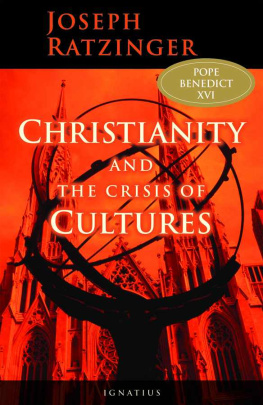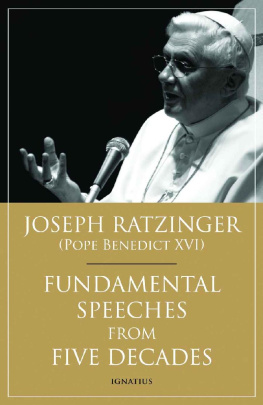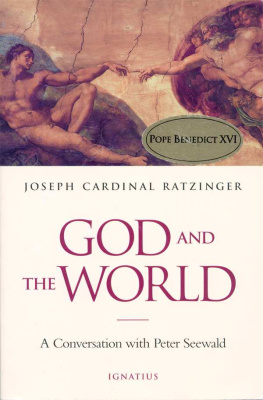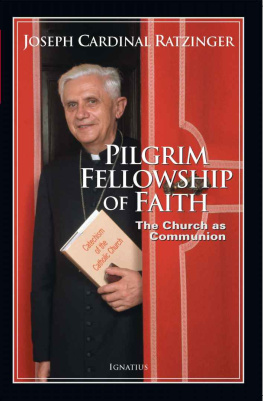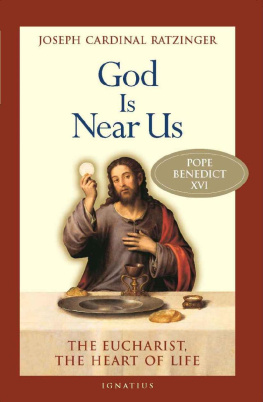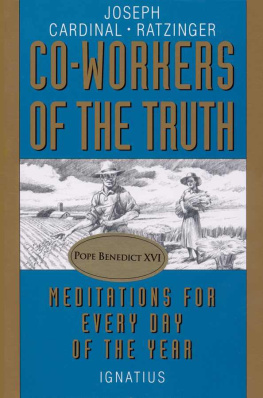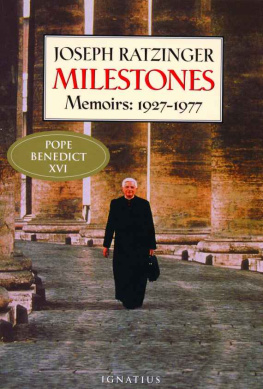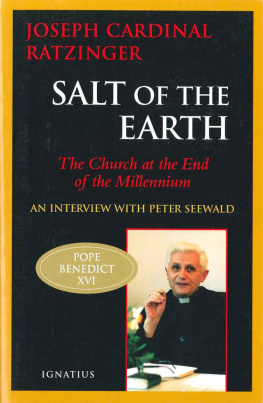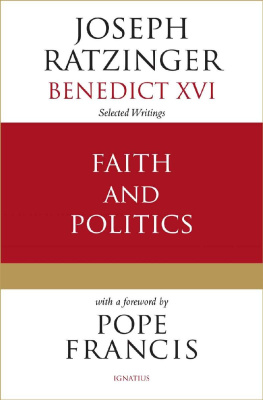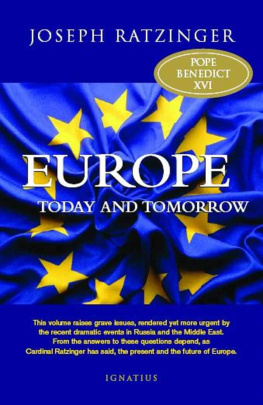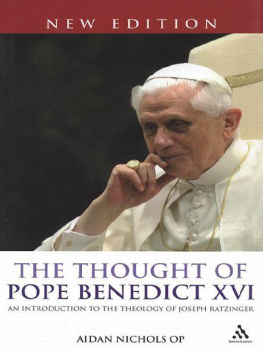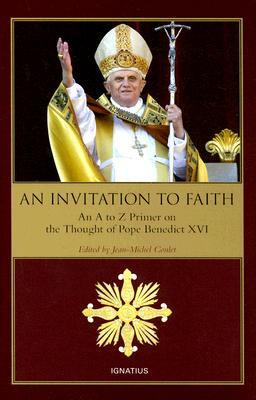CHRISTIANITY AND THE CRISIS OF CULTURES
JOSEPH CARDINAL RATZINGER
(Pope Benedict XVI)
CHRISTIANITY AND THE CRISIS OF CULTURES
Introduction by Marcello Pera
Translated by Brian McNeil
IGNATIUS PRESS SAN FRANCISCO
Title of Italian original:
LEuropa di Benedetto nella crisi delle culture
2005 by Edizioni Cantagalli, Siena
Cover photograph:
Saint Patricks Cathedral, New York
Kevin Forest / Photodisc
Cover design by Roxanne Mei Lum
2006 Libreria Editrice Vaticana
2006 by Ignatius Press, San Francisco
All rights reserved
ISBN 978-1-58617-142-1
ISBN 1-58617-142-9
Library of Congress Control Number 2005909729
Printed in the United States of America
CONTENTS
The Crisis of Cultures
The Right to Life
What Does It Mean to Believe?
1. Faith is anchored in what Jesus and the saints see
2. The verification of faith in life
3. Faiths I, you, and we
INTRODUCTION
A Proposal That Should Be Accepted
by
Marcello Pera
At the origins of what Joseph Ratzinger (now Pope Benedict XVI) calls in this book the most radical contradiction that has developed in Europe lies the great division brought about by the scientific revolution.
Galileo, in his endeavor to avoid a conflict with the Church over the relationship between the new Copernican astronomy and the interpretation of Scripture in keeping with Aristotelianism, put forward two theses.
The first thesis maintains that if Scripture is correctly interpreted, it is necessarily in agreement with astronomy, because, as Galileo wrote in his letter of December 21, 1613, to Don Benedetto Castelli:
Sacred Scripture and nature proceed equally from the Divine Word, the one dictated by the Holy Spirit, the other a most observant executor of the orders of God. When Scripture accommodates itself to our understanding of the universe, it says many things that diverge from the absolute truth, on points of detail and in terms of the meaning of words.... It seems that what our eyes observe of the workings of nature or what our senses experience or the conclusions we necessarily draw from the demonstrations of science should not at all be called into question by passages of Scripture that appear to say something different. For not every single word of Scripture is binding on us with exactly the same force as every working of nature.
The second thesis is that Scripture and astronomy are dealing with different things, the former with the salvation of men, the latter with factual questions. As Galileo wrote to Madame Cristina di Lorena in 1615:
And if the same Holy Spirit has intentionally refrained from teaching us propositions of this kind [that is, of astronomy], since these have nothing to do with his own true intentionwhich is our salvationhow can one then assert that it is absolutely necessary to hold this position rather than that, so that one is de fide, the other erroneous?... Here, I would repeat something I once heard from an ecclesiastical personage of the most eminent rank, namely, that it is the intention of the Holy Spirit to teach us how to go to heaven, not how heaven goes.
We can call the first point the thesis of convergence or of unity between science and Scripture and the second the thesis of separation or of diversity between the sphere of scientific research and the sphere of religious salvation.
At least prima facie, the two theses are not incompatible, and in the case of Galileo, a great scientist and a deeply convinced believer, they were certainly not so. Both theses maintain the possibility of reconciling science and religion, although they do so in different ways. For the thesis of convergence, there cannot be conflicts between truths of science and truths of the faith, because both Sacred Scripture and nature proceed equally from the divine Word and advance in harmony, so that every scientific progress becomes a hermeneutical progress. In the same way, for the thesis of separation, there cannot be conflicts, because both advance independently, each in its own autonomous and separate sphere and with different methods, criteria, and sources.
But although these theses may appear incompatible, in reality they are saying something different about the theoretical perspectives and about the practical consequences. And both theses have left a profound mark on European culture.
From the theoretical point of view, the thesis of convergence sees the discourse of science and the discourse of faith as two authentic forms of knowledge that are (or ought to be) in harmony. However, the thesis of separation sees scientific knowledge as authentic knowledge, because the discourse of faith is not knowledge, properly speaking, but something one believes. In the first case, knowledge is one: man knows (in the full sense of this word) both his world and the meaning of his world. In the second case, knowledge isor ends up as fragmented: there exist a public and objective scientific knowledge and a private and subjective religious belief.
What are the practical consequences? For the thesis of convergence, the science that deals with the world ought to feel itself bound to the religion of Scripture, so that it can attain harmony with the latter. For the thesis of separation, science is free and must proceed autonomously, even if Scripture should oppose it on one point or another. Science knows, and technology can. But if science is free to know, then technology is free to be able to do anything. Religion cannot pose any obstacle here, since it operates on a different level.
This is the great division that Galileo set in motion. It was the first such division, and others soon followed: between truths of faith and truths of science; truths of morality and truths of legal rights; divine truths and truths of the state; public truths and private truths. Everywherefrom science to society to the individual lifeEuropean and Western man has produced and experienced a schism, a separation between that which is and as such can be verified scientifically (with what our senses experience and the demonstrations of science) and that which ought to be and which is based on sources that are not scientific or rational (customs, beliefs, the faith).
This identification of the rational with the scientific and this gulf that yawns between science, morality, and religion are the basic characteristic of modernity. Humes law (that is, that it is a logical error to infer an ought from an is) is an axiom of our way of thinking. This is the great division and the cultural and political banner of what is rather imprecisely known as the Enlightenment.
What can I know? What ought I to do? What am I permitted to hope? If the unity of knowledge is shattered, there is no longer any relationship between these three questions. Each is left to its own devices, without any hope of receiving a reply that would be valid for the other questions, too. Kant, who asked himself these questions more systematically than anyone else and who saw more clearly than anyone else the danger of separating them, hurried to repair the breaches. In his endeavor to provide a proper foundation for science without destroying morality and faith, he made the existence of God, of liberty, and of the immortality of the soul postulates of the practical reason, without which it is not possible to act in a moral manner or to attain the highest good. Following this line of argument, morality and religion must accept that which science excludes (because it cannot be contained within the limits of the reason). Science does not prove the existence of good or evil, and it demonstrates neither the existence nor the non-existence of God; but morality and religion have need of God. Scientific knowledge prescinds from God, but moral action requires him. Here we have a genuine schism. The solution thought out by Kant did not succeed in overcoming it, because once it had taken hold, the logic of separation was more powerful than the logic of unification.

